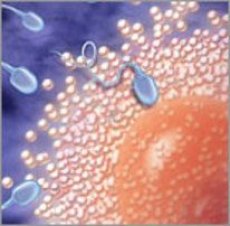Conception: 2 weeks
Last reviewed: 23.04.2024

All iLive content is medically reviewed or fact checked to ensure as much factual accuracy as possible.
We have strict sourcing guidelines and only link to reputable media sites, academic research institutions and, whenever possible, medically peer reviewed studies. Note that the numbers in parentheses ([1], [2], etc.) are clickable links to these studies.
If you feel that any of our content is inaccurate, out-of-date, or otherwise questionable, please select it and press Ctrl + Enter.

How does the child grow?
Before he actually begins to grow, the body must prepare for conception. Last week, an increase in the amount of estrogen and progesterone passing through the bloodstream promoted the formation of a blood-enriched cover to maintain a potentially fertilized egg. At the same time, in the ovaries, the ovules in the follicles ripened. At the beginning of this week (often 14 days with a 28-day cycle), you ovulate: One of the eggs leaves the follicle and enters the fallopian tube. Over the next 12 to 24 hours, the egg will be fertilized if one of the 250 million spermatozoa gets into the uterus.
In the next 10-30 hours the spermatozoa merge with the egg and the formation of genetic material. If the sperm carries information with the Y chromosome, then the sex of the child will be male, if it is X chromosome - a girl will be born. Within three to four days, when a fertilized egg (now called a zygote) passes from the uterine tube to the uterus, it will be divided into 16 identical cells. As soon as the zygote enters the uterus, it is called morula. A developing fetus is a collection of cells that is officially called a blastocyst and already has an internal cell mass that will become an embryo filled with a liquid cavity that will become an amniotic sac and an external cell mass that will become a placenta, an organ in the form of a pancake that provides the baby with oxygen and nutrients, and also displays the products of vital activity.
Important: the development of each child is strictly individual. Our information is designed to give you an idea of the development of the fetus.
Life changes in the second week of pregnancy
The last menstruation was 12 to 16 days ago, so ovulation should occur now. It may seem strange, but the gestational age of a child is considered from the first day of the last menstruation. Pregnancy lasts approximately 38 weeks from conception, but since it is often difficult to accurately determine the time of the fusion of the egg and sperm, doctors talk about 40 weeks.
To increase the chances of conception, try to have sex 72 hours before ovulation and 24 hours after. Do not despair if all your efforts have not crowned the long-awaited pregnancy, most couples need several attempts.
One of the important advice: if you are planning a pregnancy, but have not yet given up drinking alcohol, cigarettes and drugs - now is the time for this, because your body should be in the best shape for conception of the child. Do not forget to take multivitamins that contain at least 400 micrograms of folic acid (ideally three months before the onset of pregnancy) to reduce the risk of birth defects in the baby.
Make it romantic. "When we were planning the conception of the child, we made extra efforts, (We think that a good sex conception does not hurt!) So we arranged a romantic dinner with candles and the bedroom filled with flowers." We felt much closer to each other, and who knows? Perhaps it worked, and in a few months we are waiting for replenishment. " - Trish
3 Questions about ...
- The best positions in sex for conception of the child
There is no scientific evidence that certain positions in sex contribute to the conception of the child. You may have heard that the positions in which the seminal fluid quickly gets to the cervix - for example, the missionary position (male on top) is the most optimal option. But, unfortunately, there are no studies to support this hypothesis. To increase the likelihood of conception, have sex a day or two before ovulation and on the day of ovulation.
- Does the presence of orgasm affect the process of conception of the child?
There is an opinion that the female orgasm after partner ejaculation reduces the chance of conception, but there is no scientific confirmation of this hypothesis. Female orgasm is not a prerequisite for conceiving a child.
- Do I need to stay in the "lying" position after sex?
There is no scientific evidence that this matters, but it does not hurt. Remaining in a horizontal position for about 15 minutes after ejaculation, you delay the seminal fluid in the vagina. If you are trying to conceive a child for a year or longer, you are over 35 years old, or you have an irregular menstrual cycle, you need to contact a specialist.


 [
[